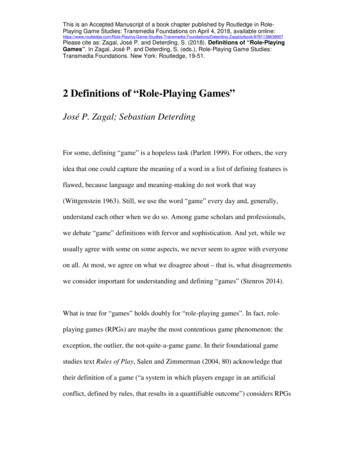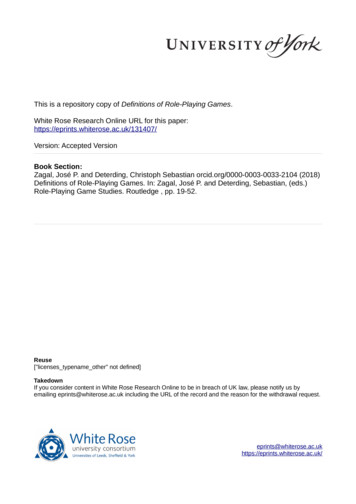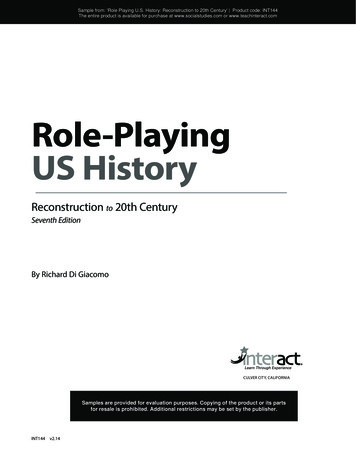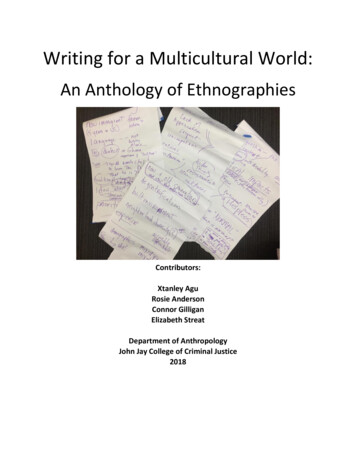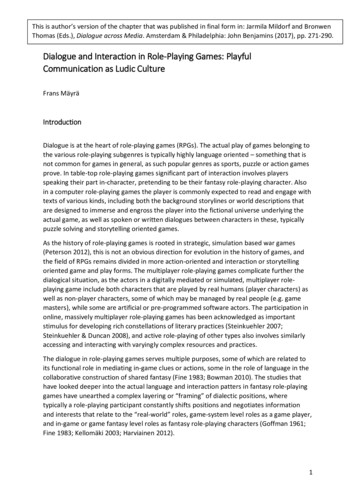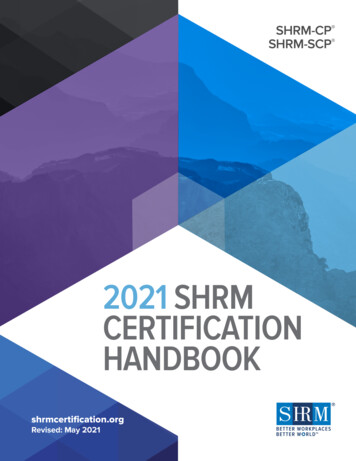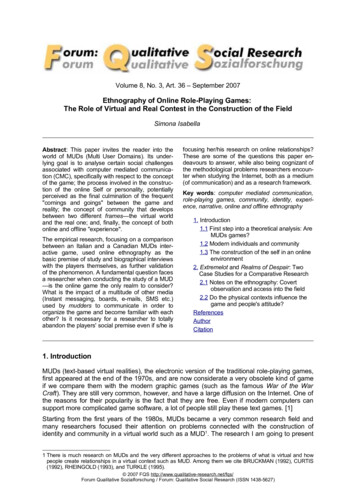
Transcription
Volume 8, No. 3, Art. 36 – September 2007Ethnography of Online Role-Playing Games:The Role of Virtual and Real Contest in the Construction of the FieldSimona IsabellaAbstract: This paper invites the reader into theworld of MUDs (Multi User Domains). Its underlying goal is to analyse certain social challengesassociated with computer mediated communication (CMC), specifically with respect to the conceptof the game; the process involved in the construction of the online Self or personality, potentiallyperceived as the final culmination of the frequent"comings and goings" between the game andreality; the concept of community that developsbetween two different frames—the virtual worldand the real one; and, finally, the concept of bothonline and offline "experience".The empirical research, focusing on a comparisonbetween an Italian and a Canadian MUDs interactive game, used online ethnography as thebasic premise of study and biographical interviewswith the players themselves, as further validationof the phenomenon. A fundamental question facesa researcher when conducting the study of a MUD—is the online game the only realm to consider?What is the impact of a multitude of other media(Instant messaging, boards, e-mails, SMS etc.)used by mudders to communicate in order toorganize the game and become familiar with eachother? Is it necessary for a researcher to totallyabandon the players' social premise even if s/he isfocusing her/his research on online relationships?These are some of the questions this paper endeavours to answer, while also being cognizant ofthe methodological problems researchers encounter when studying the Internet, both as a medium(of communication) and as a research framework.Key words: computer mediated communication,role-playing games, community, identity, experience, narrative, online and offline ethnography1. Introduction1.1 First step into a theoretical analysis: AreMUDs games?1.2 Modern individuals and community1.3 The construction of the self in an onlineenvironment2. Extremelot and Realms of Despair: TwoCase Studies for a Comparative Research2.1 Notes on the ethnography: Covertobservation and access into the field2.2 Do the physical contexts influence thegame and people's attitude?ReferencesAuthorCitation1. IntroductionMUDs (text-based virtual realities), the electronic version of the traditional role-playing games,first appeared at the end of the 1970s, and are now considerate a very obsolete kind of gameif we compare them with the modern graphic games (such as the famous War of the WarCraft). They are still very common, however, and have a large diffusion on the Internet. One ofthe reasons for their popularity is the fact that they are free. Even if modern computers cansupport more complicated game software, a lot of people still play these text games. [1]Starting from the first years of the 1980s, MUDs became a very common research field andmany researchers focused their attention on problems connected with the construction ofidentity and community in a virtual world such as a MUD1. The research I am going to present1 There is much research on MUDs and the very different approaches to the problems of what is virtual and howpeople create relationships in a virtual context such as MUD. Among them we cite BRUCKMAN (1992), CURTIS(1992), RHEINGOLD (1993), and TURKLE (1995). 2007 FQS http://www.qualitative-research.net/fqs/Forum Qualitative Sozialforschung / Forum: Qualitative Social Research (ISSN 1438-5627)
FQS 8(3), Art. 36, Simona Isabella : Ethnography of Online Role-Playing Games:The Role of Virtual and Real Contest in the Construction of the Fieldin this article starts from four theoretical hypotheses, which I will briefly describe in order tobetter understand the methodological issue concerned with a virtual ethnography. [2]1.1 First step into a theoretical analysis: Are MUDs games?Since MUDs are considered the online adaptation of the traditional role-playing game Dungeons & Dragons, I started my analysis from the concept of questioning whether MUDs can bestill considered games or not. At a first glance, it seems that the only difference between thetwo types of games is a different way of interacting: traditional role-playing games use face-toface communication, while MUDs employ a mediated one. Actually, the technical support thatmudders use to interact and to play (a computer and the Internet), has completely changedthe mode of playing, not only from a technical point of view, but also in the way peopleexperience play. The concept of game I started from is the one proposed by the Dutch scholarJohann HUIZINGA (1938) in his book Homo Ludens and by the French sociologist RogersCAILLOIS (1967) in Les Hommes et les jeux. They affirm that a game is a social activitycharacterised by certain peculiarities: first of all, a game should be a free activity (that meansthere should be no constraints); it should be unproductive and always have an uncertain result.The fourth clause is that a game has to be an activity separated from ordinary life: a game hasits own space and its own time which should be decided before the game starts and withinwhose borders only the rules of the game are valid while those of ordinary life are no longerapplicable. In my opinion, MUDs, as the online version of the traditional D&D game, respectthe first three rules while there are some problems in defining the fourth one. In a context ofcomputer mediated communication (CMC), the categories of time and space are weaker thanin a physical context. Moreover, the possibility of working at the same time on more than one"window" on the computer screen allows mudders to play during work or study time, as we cansee from their own words:"I usually play at work and it usually works in background, I'm usually online when there arethe people I'm talking to and when I go back home, while I clean my cats or while I'mwatching TV I jump there quickly to say 'hallo' or checking something important on theweekends, when I have nothing to do and I'm boring I play a couple of hours " (CA/3, F,29).2"Right now my job is predominantly office work, which means lots of telephone calls, lots ofpaperwork . In this job there's a break every five minutes, also because in the morning, thegame is not very exciting so I keep the window open but my real attention is mainly focusedon my office work . it's in the afternoon when I play a lot, also because in the afternoon'friends' arrive and so I focus a little more attention on the game" (ITA/2, M, 34).3 [3]It seems obvious that the activity of playing is not completely separated from those of ordinarylife. [4]The issue of time and space in online role-playing games can be related to an overall discourse on the ways new technologies of communication change how people perceive themselves and the reality in which they live. Typical of mediated communication is the phenomenon of disembedding (GIDDENS, 1990), a term that refers to the complete detachment ofplaces from contextualised spaces and, subsequently, from time. Even if CMC (computermediated communication) allows people to extend their relationships without the constraint ofphysical reality, it also obliges people to learn new codes and new languages in order tocommunicate in a de-contextualised environment:"Basically because text interaction is not enough, you know, it's good to talk, yes but youalso need get together, party, talk freely, laugh, have fun, you know distance is lots of theproblem " (CA/4, M, 21). [5]The Internet is often described as a non-lieux, using the well-known concept of the Frenchsociologist Marc AUGE' (1992)—a non-place where there is no possibility to develop identityand genuine relationships. Only solitude and similarity, affirms the author, oppose these2 Every interview quotation is classified with ITA or CA to indicate if the informant is Italian or Canadian followed bythe chronologic number of the interview. F and M indicate the gender followed by the age of the informant.3 All the Italian interview quotations in this article have been translated. 2007 FQS http://www.qualitative-research.net/fqs/
FQS 8(3), Art. 36, Simona Isabella : Ethnography of Online Role-Playing Games:The Role of Virtual and Real Contest in the Construction of the Fieldplaces to those which he calls "anthropological places" where there is a symbolic constructionof space and people can establish authentic relationships. If AUGE's (1992) concept of nonlieux can be acceptable for BBSs (Bulletin Board Systems) or newsgroups, where anonymousnicknamed participants exchange opinions about different topics, I think it is not suitable forMUDs where fictional (virtual) characters, animated by mudders, have a history and move in avery contextualised environment where the communication, even if mediated, retains a contextwith its own spatial and temporal dimension4. [6]This new form of re-contextualised mediated communication, that is typical of MUDs and thatdistinguishes these games from other virtual environments, seems to be the result of a (virtual)reconstruction of a physical space, where characters move inside the game, and also theoutcome of strong relationships established among players. MUDs can, in fact, be defined asplaces outside the spatial and temporal dimension of the ordinary life, but not completelydetached from it because of the continuous coming and going between the online and the offline dimension, where everything is based on interactions and relationships among players. [7]Among different models of association, SIMMEL's concept of Vergesellschaftung (1917)seems to be the one that best describes relations in MUDs. The German sociologist affirmsthat even if people usually associate according to commercial, religious or sentimental impulses, there is one form of association that goes beyond utilitarian interests. It is a veryinteresting form of association, founded on the pure pleasure of conversation. Typical of thissort of association is the fact it could occur only as a particular moment completely detachedfrom reality; a moment during which individuals participate at the interaction solely as humanbeings, while any other characteristic (age, gender, social status) that is not strictly required isleft out of the interaction. That is exactly what happens in MUDs as most of the informantsconfirm:"Lots of these people have good relationships through the text and we don't care if you are150 tons who cares!!!" (CA/13, F, 28)."They weren't judging me, they were judging me for me. They're not judging you on yourappearance, they are not judging you in any way, just you for you " (CA/15, F, 25). [8]Information regarding the age, gender, and social status of players remains outside gameinteractions because they can interfere with the game itself and with the creation of thisparticular form of association5. Since the computer mediated communication that is at thebasis of MUDs relations goes beyond the physical dimension of interaction, it allows thisparticular form of association, even if players know very well that the rules of online Vergesellschaftung are very different from those of face-to-face communication. [9]1.2 Modern individuals and communityThe second theoretical issue, I would like to raise concerns the concept of the modernindividual in relation to the concept of community. The hypothesis I tested in my researchconcerns the idea that communities created around these games have some peculiarities ofboth traditional and pre-capitalistic societies and some others, of post-modern ones. MUDenvironments seem, in fact, to reproduce the typical traditional society based on small familiargroups, in which people live, considering themselves as part of a community. In this kind ofsociety, identity is not founded on peculiarities someone has as single individual, but is basedon the fact she/he belongs to the community. This means that her/his whole existence isstrictly tied to belonging to the community; she/he cannot choose freely her/his own destiny,which remains tightly dependent on decisions that the community make for each member."I've become attached to my character and I've tried to make it develop, to make it improve,and try to make it become a famous character, carving its own space, its own circle ofcontacts and friends, interests . and the contacts will allow it to change direction of the4 Even if they are textual games, MUDs have a precise setting that could be a medieval village or a futuristic town,where only certain kind of characters—coherent to the environment—can exist.5 One of the risk of face-to-face meetings is the difficulty, when in game interactions, of putting aside such individualcharacteristics that can destroy the particular form of association of the Vergesellschaftung. Many informants,however, declare that it is more important to get together and make friends than to have perfect interactions ingame situations. 2007 FQS http://www.qualitative-research.net/fqs/
FQS 8(3), Art. 36, Simona Isabella : Ethnography of Online Role-Playing Games:The Role of Virtual and Real Contest in the Construction of the Fieldgoals to reach and therefore, as a result of the change in goals its characteristics willchange accordingly" (ITA/2, M, 34)."My game is always and has always only been for the Guild. I've travelled all the steps of thehierarchy slowly . I've been the deputy Master for a year and a half and now I've been theMaster for about eight months. This role is truly more demanding and you really can nolonger call this a game especially at this level" (ITA/16, F, 38). [10]The social environment represented in MUDs is really different from the one we are used to incontemporary society: one of the peculiarity of these "virtual worlds" is the creation of a stronghierarchical society at whose base the so called Newbies (new players) remain while at the topthe people who write and manage the game are positioned: Immortals, Gods or Wizards 6. Asin traditional societies, no one could exist in MUDs if not included in this established and veryrigid order. On the contrary, in contemporary societies, people conceived of themselves as"individualised" individuals, which means they are totally free from every duty that they mighthave in the community to which they belong and are free to take decisions for themselves andtheir future. [11]The modern world, as Zygmund BAUMANN (2000) in most of his works recalls, is characterised by the speed and continuity with which changes happen in the social environmentwhere people live. It is a world of possibilities, a world where individuals, free from everyconstraint, can move from one social context to a different one. [12]Since the beginning of the 20th Century, scholars have talked about the situation of modernindividuals who lived in big cities. Georg SIMMEL (1903), in his essay on metropolis, calls theinhabitants of the city of that time blasé and defines inhabitant as a man who seems totallyindifferent towards what happen around him. This sort of isolation from the external world,typical of the modern age, is a way to protect the Self from the continuous and rapid stimulipeople experience from the outside and, at the same time, a way individuals have to protectthe personal independence that they gained living in a contest, freed from traditional familiarconstraints, as in a metropolis. As complementary figure to SIMMEL's blasé inhabitant, PeterBERGER (1984) chooses the protagonist of MUSIL's novel Man without qualities (1932). ForBERGER, that man is the symbol of modernity because he is open to all the possibilities thatlife offers him. He has a disaggregated Self and always lives continuous shifts from onesphere of reality to another one. He is always in progress, as the modern age requires him tobe and, even if he is more independent than before, he is condemned to live with a more andmore precarious chance of maintaining unaltered the capacity to live without the doubt thatreality is different from the way people perceive it. Free people have, in a modern society,many risks, according to the German sociologist, Ulrich BECK (1994). The biography ofpossibility and conquest of the modern age is a "self-made biography" that can easily turn intoa biography of failure. One of the consequences of modernity is that individuals are free frombelonging to a community, but they are alone and totally responsible for the choices they makefor their future [13]With regards to MUDs, I believe that people play these games in which they have to submit toa series of strong rules and re-establish a model of "belonging" relationships because of theneed people have to recognise themselves as part of a group in a historical period duringwhich these aggregations no longer exist. These are the words of an informant who doesn'tplay anymore but he still feels part of the community:"It's my home [ ] I'm an Immortal, I pop in once in a while because it will always be part ofmy life. I can't just abandon them because they are my friends" (CA/1, M, 23). [14]Moreover, in the game, mudders identify themselves with the role that they play in that fictionalsociety and have the duty to accomplish all the tasks that their characters have to contribute tothe games' whole society ("When I was an Immortal they gave me an area to check for a whileso in that period I was constantly, constantly online ." CA/13, F, 28). In the community peoplecreate as players (but outside game relations), there are duties that can bind people and force6 On this topic see REID (1999) and TOSONI (2004). Both authors demonstrate how social structure of MUDs isnot an example of democracy, in spite of the opinion of many scholars who say the Internet is the best placewhere democracy can affirm itself. 2007 FQS http://www.qualitative-research.net/fqs/
FQS 8(3), Art. 36, Simona Isabella : Ethnography of Online Role-Playing Games:The Role of Virtual and Real Contest in the Construction of the Fieldthem to participate in a series of activities that usually every small group (a clan, a guild or anorder) organises. [15]The commitment which mudders have in spending their time in activities for the community(for example administrating a forum, writing Quests in order to let people play or simply being"there" (online) if someone needs to talk) is very similar to the concept of dépense improductive that the French sociologist Georges BATAILLE (1967) conceived in opposition tothe notion of utility and production. The concept of dépense improductive is based on thenotion of "perte", affirms BATAILLE, "qui doit être la plus grande possible pour que l'activitèprenne son véritable sens" (1967, p.33). In order to explain this concept of loss (perte),BATAILLE gives the example of potlatch, the traditional form of trade in some ancient communities where relationships were very important and maintained by this continuous exchangeof "gift/donation". In the same way, I think, mudders create a strong community that cannot beexplained within the classical concept of community, based on the idea of belonging, asclassical sociologists like Ferdinand TÖNNIES (1887) and Max WEBER (1922) explained, buton this idea of loss that, in the case of mudders, is loss of time they spend playing and beingonline (whenever they can) for the community. Since the concept of community is verycontroversial (in sociology), it seems to me that the idea proposed by the Italian scholarRoberto ESPOSITO (1998) could be very useful in order to understand these new forms ofsocial aggregation typical of contemporary society. Starting from an etymological study, heaffirms that the debates on the concept of community derive from a paradox inherent in theterm "community" itself. The word "community", in fact, derives from Latin and has two meanings: the most widespread cummunis that means "in common" and a less used cum munusthat means "with a duty/gift" to give and to receive. As ESPOSITO explains in his work, theparadox consists in the fact that a community is not a property, but a quality people whobelong to the same group share. There is, in fact, a contradiction in possessing something thatshould be held in common. On the contrary, the community is something that has to do withthe idea of a reciprocal donation. The conception of a debt someone has toward othermembers of a group is the fundamental principle of a community and establishes very closerelations among people of the same family/order. Even if in computer mediated environmentlike MUDs escaping from relationship could be easier than in physical world, nobody disappears without a valid reason. It seems obvious that the duty (munus) on which mudders foundtheir community is the idea of "being there", of being always present in the relationship, assome mudders explained:"I have just to be available if someone needs me " (CA/15, F, 25)."Well, all my free time is taken up with the game. Any chance I get I have that on mycomputer" (CA/2, M, 19). [16]1.3 The construction of the self in an online environmentStrictly connected with the concept of community is that of identity. The third hypothesis,around which I developed my research, concerns the idea that, in a MUD environment, theprocess of construction of the Self is a creative process very similar to the one that, accordingto Freudian analysis, involves children psychic growth in the first years of their lives. [17]Starting from the late 80s, many researchers focused their attention on CMC and virtualenvironments like MUDs, underlining the idea that the massive participation in these gameswas a way to escape from reality. The idea that players confuse the "real" world in which theylive with the "virtual" one of the game has become a common and contributes greatly to alabelling of this phenomenon7 that is still very frequent. I would suggest a more moderatestance than the very radical position of the American socio-psychologist, Sherry TURKLE(1995) who believes that MUDs are points of non return because players completely lose thecapacity to reconcile their "real" life and their "virtual" one. [18]In connection with the third hypothesis, I found the concept of transitional objects by theEnglish psychologist, Donald WINNICOTT (1971) very useful. Developed in his book, Playing7 On labelling phenomenon see BECKER (1963). In his ethnographical studies on two different social groups.BECKER explains the labelling theory and the concept of deviance that could be seen as a consequence oflabelling processes. 2007 FQS http://www.qualitative-research.net/fqs/
FQS 8(3), Art. 36, Simona Isabella : Ethnography of Online Role-Playing Games:The Role of Virtual and Real Contest in the Construction of the Fieldand reality,. WINNICOTT stated that a child initially makes no distinction between inner desireand outer reality, experiencing the mother's breast (or the bottle) as part of its inner reality thatmagically appears when needed. In WINNICOTT's account, as the mother becomes lessadapted to the infant's needs, the child begins to experience the frustration of failure and thebeginnings of a transition to the recognition of the autonomy of outer objects. This is assistedby a transitional object, a bit of blanket, toy, or cloth that is under the infant's control and isreliably present when needed. The transitional object opens the realm of play, where realobjects are incorporated into the world of make-believe over which the child has some control,a realm which is not challenged by the question if objects are part of inner or outer reality. Therealm of play is immensely exciting because it is precarious, an interplay of personal psychicreality and the experience of control of actual objects. It is an intermediate area of experiencing, to which inner reality and external life both contribute. It is a resting place for theindividual engaged in the perpetual human task of keeping inner and outer reality separate yetinterrelated. This "in-between area" is the place where creativity takes place and thatguarantees a healthy development of personality. Even if adults can clearly distinguish theinner and outer reality, they can still experience this transitional area in particular situations likeplaying or in some activities like artistic and scientific endeavours."I find it really help me for my creative side I'm a role player, it allows me to be creative, ithelps how to develop my character, he is how I am so help me to figure it out, it's like amirror of myself" (CA/4, M, 24)."I create my character and I let her grow inside the game and she is like me, because Isoon realised that I could not play a character different than me [ ] when I play I expressmyself, I act as I really am " (ITA/5, F, 29). [19]Back to MUDs, the theory of transitional objects seems to me very functional in order toexplain some phenomena that involve players of these games. In particular, I would like tosuggest the idea that the role (character) that every player plays in the game can be considered as the transitional object that mediate the relationship between the physical world inwhich players live and the fictional one in which mudders participate as actors in the virtualsetting of the game."I've never role played before, I don't know but in my case I used to play an extension ofmyself it was easier to be myself, I was teenager at the time and I was terrible shy,terrible, terrible shy, so it was easier for me to talk in that world where you can be what youwant to be and you can say what you want to say" (CA/13, F, 25)."When I'm role playing and I have a different take on it, it's me any longer. I haven't donethat in a while, so I don't really know where I'm going with that. It's basically me. I don't thinkI really act different. I'm a little more sociable" (CA/9, F, 31). [20]Furthermore, the game and ordinary life are not separate dimensions in players' lives; on thecontrary, they could be intended as two complementary cognitive and communicative frames(GOFFMAN, 1974). In fact, mudders' engagement in the game consists in a continuouscoming and going between the online and the offline frame, that is. between the game andordinary life activities and it could be seen as the intermediate area where people can stillexperience a retrieval of creativity8 that, in the game, reveals a regained ability of tellingstories. [21]MUDs are text-based virtual realities. This means that there are no graphic elements in thegame but only texts written by players. Every mudder logs into the game and starts performingher/his alter ego (character) while interacting with other characters that live in that fantasticworld created by players' stories. The involvement that players show in the game is not immediate. On the contrary, the integration into the game world comes about through the player'scapacity to tell about her/his character, to create a coherent background of the character'spast life and to interweave relationships in the present time of the game9. The growth of a character is strongly connected with a mudder's capacity to tell about her/his alter ego and to connect her or his character's biography with the main story of the game. Mudders don't only chat8 I use the term creativity in the same way WINNICOTT (1971) explains it in his book, that is, as the capacity,typical of children but also present in particular aspect of adult life, people have to play with part of theirpersonality.9 Here one of the example of mudders capacity to talk about the character they play: 2007 FQS http://www.qualitative-research.net/fqs/
FQS 8(3), Art. 36, Simona Isabella : Ethnography of Online Role-Playing Games:The Role of Virtual and Real Contest in the Construction of the Fieldthrough performing their characters, but also they create a world with words. Playing a MUD islike a performative utterance (AUSTIN, 1953): what people write is immediately a fact. [22]The narrative dimension we can find in MUDs, has a double aspect (JEDLOWSKI, 2000): onone side, it seems very similar to the traditional Bildungsroman, and on the other side to themodern serial fiction. It seems to refer both in some peculiar aspects of the modernfragmentary experience (Erlebnis) and to some characteristics of the experience as trainingroutes (Erfahrung10). [23]The relation between online and offline experience can be synthesised by the concept ofmultiple Self proposed (among others) by the Italian sociologist Alberto MELUCCI (1991).Contemporary individuals have to get used to multiple situations of the complex society inwhich they live, and have to learn to shape their identity in a game of continuous metamorphosis. Like acrobats, mudders learn to manage the complexity of living various frames,whose boundaries are like osmotic membranes11, and experiencing the different sphere of lifein a continuous coming and going. [24]2. Extremelot and Realms of Despair: Two Case Studies for a ComparativeResearchIn order to verify the theoretical issues I have raised, I conducted empirical research consistingof Italian and Canadian case studies. The research started in January 2004 and ended inAugust 2005. During this period of time I chose the two MUDs, I started play the games withmy own character and developed my covert ethnography by writing ethnographical diaries12."Rhyl is not my first character but she was the main character for mostly of the game I played, it'sfunny because I played D&D for years and I never thought at the character [ ] when I was 16 mycharacter was an extension of me and that was not fun, there's no creativity . so I create Rhyl. Sheis a drow elf, a dark elf, an evil elf, she lives underground , she was a young character, noble family,she was involved in a simulation project and she joined the (name of the guild) then she grew up andbecame the leader of the Nation . she was deported in Civil War that was the most amazing roleplaying plot that have
'friends' arrive and so I focus a little more attention on the game" (ITA/2, M, 34).3 [3] It seems obvious that the activity of playing is not completely separated from those of ordinary life. [4] The issue of time and space in online role-playing games can be related to an overall dis-




